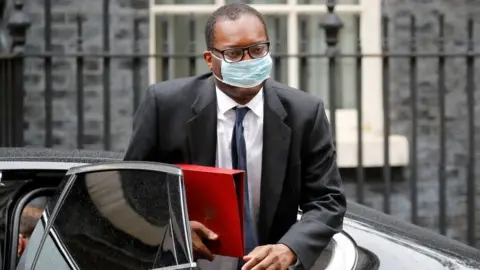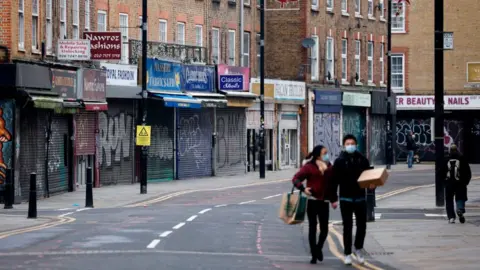UK not going to do anything to make EU 'go crazy'

 AFP
AFPThe UK has an opportunity to reform regulation that is derived from EU law, but won't deliberately antagonise its biggest trading partner immediately after the Brexit deal.
That was one of the key messages sent to around 30 business leaders in a meeting led by the Prime Minister, the Chancellor and the Secretaries of State of Business and International Trade.
One business leader told the BBC that the government, "in the absence of enormous government spending power, given the state of the public finances, should look at whether deregulation could do some of the post-Brexit, post-Covid heavy lifting to stimulate business".
Another said that there was an ideological divide within the Conservative Party about the potential to "rip up the rule book" when it came to regulation.
However, the government has insisted that although all regulation that has entered UK law via membership of the EU is subject to review, there is no intention to lower or loosen standards on the environment and workers' rights.
Business Secretary Kwasi Kwarteng has previously denied newspaper reports that the government intends to use this opportunity to review EU derived rules on maximum working hours, scheduled breaks and holiday entitlement.
It comes after the Financial Times said some protections brought in under EU law - such as the 48-hour limit on the working week - could be scrapped.
New rules on rest breaks and changes to how holiday pay is calculated from overtime could be proposed, it added.
Mr Kwarteng insisted he wanted to "protect and enhance workers' rights going forward, not row back on them".
Attendees from some of the UK's biggest companies described the meeting as "positive" and "a useful discussion", but "light on detail".
 AFP
AFPThe BBC understands that the meeting opened with an upbeat message around coronavirus vaccination rollout and how that would restore the normal functioning of the economy, but no firm dates were given as to what could re-open and when.
The overriding feeling from attendees who spoke to the BBC was that the government was very cognisant of the role business could and should play in its attempt to "Build Back Better".
The infrastructure connecting business and the government have been damaged over the last four years.
However, most people on the call spoken to by the BBC say they detected a new and real ambition to mend those bridges.
We have been here before. Lots of new leaves have been turned over when it comes to business and government relations.
The acid tests may come first with the government's response to the ongoing problems in EU-connected supply chains, which are severely affecting business and hauliers, and second with the Budget scheduled for 3 March, on which many questions will hang.
